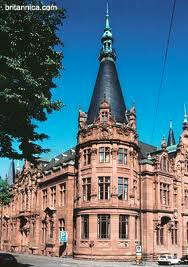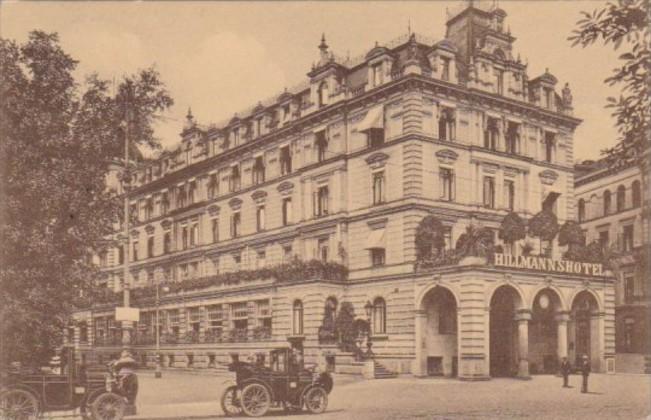Pauahi’s European Travel Journal 1875-1876
Germany
Sources: Pauahi by George Kanahele, Chapter 5: Revelations of an Odyssey
Student transcriptions from Ka Moi, 1935-37
Transcriptions of Dani Gardner, KSG 1961
Please cite: Kamehameha Schools Archives when using information from this website
Disclaimer: all images of Europe are from the Internet to enhance the text
Hillman’s Hotel
Bremen, Germany
8 p.m. Thursday,
November 4, 1875
We have just arrived from Bremen-haven by sail [rail] All of our passengers, about fourteen in all, are here at the same hotel. We had good passage of the 12 days from New York. Three days very rough. Three of our passengers landed at Southampton, a Mr. and Mrs. Alberti [Alberté] and Mr. Bartels, whose departure we regretted much as he was very agreeable and amusing. By tomorrow we shall all be scattered. I shall be sorry to part with our fellow shipmates, for we have found them pleasant, and kind.
November 5
Our friend, Mrs. Haohfelo [Hackfeld], came to see us as soon as she heard of our arrival. Afterwards—we went with Mrs. Haohfelo [H.] to see Mrs. Pfluga [Pfluger, who is just recovering from her confinement]. Her [The] little baby girl is almost a month old. After we have made the visit, Mr. Bishop [Mrs. H] and I drove to the “Bourse” to see the business men doing their business at the exchange. We were up in the gallery, and so had a fine view of the whole room. The noise they made echoed through the building. It was very odd. Then met Mr. Haohfelo [hackfeld] and Captain Gkorkin at 6:30 o’clock. We went to the opera and heard the opera of “La Dame Blanche” for the first time. The singing was very fine, and the scenery good—afterwards went to the Hackfelds and had supper—then home.
Saturday, November 6
Mr. Bishop [Mrs. H.] and I were out shopping this a.m.—bought several dozen napkins—a velvet palatot [paletot] dressing gown—worsted work, etc. It rained most of the day. In the afternoon we drove to the new part of the town where are the finest residences facing the river. This evening about 8 o’clock we went to the Rathskells [sic], a favorite place of rest for ladies and gentlemen, and strangers also to drink, eat, and smoke. In the vaults of this cellar are stored casks containing wines 450 [250] years old. We drank of several of the choicest wines and also of that called the “Rose” which [has been in the cellar 250 years. On the side of this cellar] is a row of apartments like cabins with doors, so that persons inside of one can shut themselves in, and be quite private. In the center is a table with benches each side to sit on. There were six of us, Mr. and Mrs. Mackfeld, Mr. and Mrs. Gladi [Glode], and ourselves, and we occupied one of these and had a nice supper of oysters, stewed chicken and caviar.
Sunday, November 9
Mrs. Hackfelor [H.] and ourselves attended church today, the service being in German, a language we do not understand. We were not much edified. After church we went back to the house and our kind hostess sent for a carriage to take us to the club house and other places. Mr. Gladi [Mrs. Glode] having joined us, we went to the former palace and admired the grand rooms devoted to the exclusive use of the gentlemen. After leaving this, we (Mrs. Hackfelor [H.] having left us to return home) [we] drove to the picture gallery— a small but fine collection of pictures. From this, we drove around to see the city, crossing [crossed] the bridge to the other side of the river and back by the grand new bridge, recently opened to the public and named the “Emperor bridge” [after the present emperor]. Through some of the oldest streets to the house of our friends. [where] We spent the rest of the day, and dined [dinner] with them. A German professor and his wife were also of the party. Being very unwell, we left early in the evening to return to our hotel. Since then we have been packing ready for tomorrow’s journey, but I am far from well.
Cologne, Monday p.m.
This afternoon we left Bremen, where we have spent three days most delightfully, by the 2 o’clock train for this place. Mr. and Mrs. Hackfelor [Hackfeld] and Henry Pfluger saw us off at the station. We were sorry to part with them, for their kindness and hospitality had greatly contributed to this enjoyment of our visit. It is very rainy and stormy tonight. Indeed, we left Bremen in the rain, and it has accompanied us to this place. We have a comfortable room at this hotel; it is called the “Hotel du Nord [Nard].” It is near the railway station as well as to the cathedral, which is the principal attraction here.
Tuesday, 9th
I have been very unwell all day, having caught a fearful [dreadful] cold at Bremen, and it being rainy and disagreeable outdoors, I have kept very quietly in my room the whole day. Mr. Bishop [B.] has been out exploring the town and visiting the “Dom.” This evening, feeling somewhat better, we went to a concert. The music was good and the orchestra very fine, but altogether the concert was nothing extra. I am, however, the elite of Cologne.
Wednesday, 10th
After breakfast Charles [C] and I started out to visit some of the principal places of [in] Cologne. We went first to the Jesuit church, the inside of which is overloaded with ornaments, carvings, etc. From there we went to the church of St. Ursula, a church 800 [400] years old, in which is a monument erected to St. Ursula, an English princess, who, according to the legend, when on her return from a pilgrimage to Rome, was cruelly murdered at Cologne with her 1100 [11,000] virgin attendants. The bones of these virgin martyrs are preserved in cases placed round the church, and the skulls are encased in crimson velvet, most beautifully embroidered in gold and silver and different colored silk threads, the work of the nuns, who at one time were attached to this church. We next visited the “Dom”—by far the finest and grandest cathedral in Germany. There are now about 500 working men, working daily on the church and it is said that in about eight years it will be finished. The north, south and east and west doors of the cathedral are each an expert [a perfect] work of art, and on the three sides are flying buttresses beautifully carved in leaves and fruits, and on the west side is the grand tower, in which they are now at work. This afternoon we start for Coblenz.
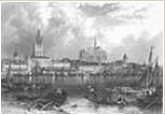
Coblenz, Wednesday evening, 9th
We have just arrived and are established in a fine room of the “Hotel Geant.” This city is situated at the confluence of the Rhine and the Mosel—which latter river we crossed over a fine bridge just before entering the city. It was dark when we arrived, so we saw nothing of the place, and now to bed.
Thursday, 11th
This morning we left Coblenz in a steamer so as to have a fine view of the prettiest parts of the Rhine, and we were not disappointed although it was fearfully cold and windy and part of the time rainy, so that we could not be much on deck. Yet we saw a good deal from the windows of the steamer, and whenever it was practicable, we rushed up on deck, and thereby managed to see the towns and villages, castles, and vineyards everywhere. The sides of the hills were covered with them, not an inch of ground that could be made use of but that was cultivated—indeed everywhere we have seen from leaving Bremen until now. The fields were in high state of cultivation. Most of the castles we saw on the Rhine were in ruins and all picturesquely situated with villages clustering at their feet. The ruins all along the way to Bingen were lovely to behold. At Bingen we took the train for Frankfort [Frankfurt]via Mayence where we arrived at about seven o’clock this evening. We have just had some supper and are feeling very tired. This hotel is an immense one with four sides and a court in the center. It is called the “Hotel Swan.”
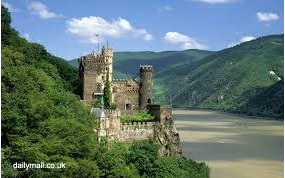
Friday 12
We visited this morning the Kaisersaal in the Romer in which are the portraits of the Emperors of Germany and Austria and it is interesting also from the fact that the new present emperor of Germany dined with the electors and showed himself to the people from the balcony. From this we walked by the river Main to the Stadel Art Institute, in the Mainzer Strasse, where are to be seen some very fine paintings, mostly modern. After a visit of an hour to this gallery, we went back to our hotel and there got into a street tramway, and I rode out about a mile to the “Palm Garden.” The palms are all under glass, and at one end of this glass house is a grotto and walks and paths through the grounds. We saw many plants which grow in our climate. It was a beautiful place. The grounds outside were beautifully laid out, with fountains and miniature ponds and Swiss chalets and summer houses. In summer it must be very delightful, but now it is very [too] cold to be out on the grounds. On returning home we took a stroll down the “Teil,” the principal and the handsomest street in Frankfort [Frankfurt], As the days are now short, it soon became dark, and we traced our steps back to the hotel, not however without looking into all the shop windows and admiring the wares exhibits [exhibited] in them. Heidelberg,
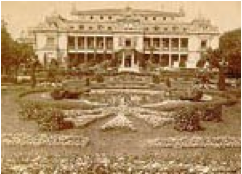
Saturday 13
We came from Frankfort [Frankfurt] this morning by rail, and arrived here a few minutes before one o’clock—just in time for a table d’hote dinner at the “Prince Carl.” At the Heidelberg station whom should we encounter but an old friend of ours, a Mr. Pitman, whom we knew many years ago. He saw our name on our luggage, and he began to look around for us. He had come in the same train bound for his home in Stuttgart, having just returned from the United States, where he had gone to be present at his son’s wedding. After dinner Dr. Hillebrand came directly to see us, and after making the visit he asked us to go up to his house and see Mrs. Hillebrand and take tea with them—which we did with pleasure. Mrs. Hillebrand is looking very much the same as when we saw her last, six years ago. The doctor looked decidedly better, and their little boy has grown to be a fine looking lad. We spent a very pleasant evening with them, talking of the old times, and answering many questions they put to us.
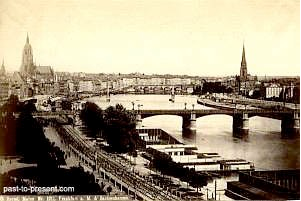
Sunday 14
Dr. Hillebrand joined us after breakfast this morning and we walked up to the castle, about five minutes walk from our hotel. The ascent [descent] was rather steep but the road was good and you would soon find yourself on the terrace, in front of the castle, more than fully repaid for the exertion—for the view of the country around, and beyond where are seen numbers of villages, the mountains opposite cultivated to the top, the river Necker, running boisterously along, spanned by a most magnificent bridge of stone ornaments with statuary, and then the little town of Heidelberg, famous as the seat of an university, clustering at the foot of this most interesting and the most extensive ruins in Germany. Truly the ancients understood the art of building castles for their works, are remarkable, not only for their beauty in architecture, but also for their solidity and durability. We returned to our hotel just in time for the table d’hote dinner at one o’clock. This is the usual dinner here [hour] in Germany. After dinner we took a carriage and drove across the bridge to the opposite side and up the valley along the river sides, passing through numbers of villages for about three or four miles, and then returned, and just before getting to the bridge, a rain storm came up, but as we were well protected, we did not suffer. We drove to Mrs. Hillebrand’s where we had tea and spent our last evening with them
